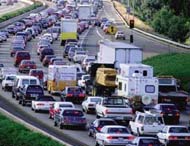2/25/2008
Motorists Not Convinced by Federal Tolling PushFederal Highway Administration study of motorist attitudes finds extreme skepticism toward congestion taxing.

A US Department of Transportation study of motorists' attitudes toward congestion taxing and conversion of freeways into toll roads found the public highly skeptical of the concept. With focus group surveys conducted in Northern Virginia and Philadelphia, Pennsylvania, the Federal Highway Administration attempted to gauge public acceptance of its policies in a report released in December.
"The discussion guide questions were designed to elicit the public's candid perspectives about the transportation issues that matter to them," the report explained.
In particular, the study was designed to investigate attitudes toward congestion pricing. Congestion pricing is a proposed alternative to the idea of reducing traffic backups by increasing road capacity. Instead, officials would create a new infrastructure that levies a tax on motorists who use the existing road network thereby "easing traffic congestion." The tax would vary during peak travel times and come with a promise that other taxes might be reduced.
"Most respondents, however, were lukewarm or unsure about the concept," the report found. "People's willingness to consider a congestion pricing system seems to be due, in part, to their sense that traffic congestion has only gotten worse over time and that 'something has to be done.'"
Few respondents expressed positive opinions about the system from the start because few believed the government would follow through on its claims. Openness to congestion taxing was found only after respondents were asked to imagine an "alternate universe" in which everything worked as stated in the material. According to the report, this material was "overly favorable towards the new system" which generated so many complaints in the Northern Virginia focus group that the material had to be changed for the Philadelphia focus groups. The reactions of participants, suggested the hypothetical scenarios such as increased use of public transportation and carpooling in response to congestion pricing were not realistic.
"While some mentioned that the new system would provide an incentive to carpool, most did not seem willing to carpool themselves," the study found. "That is, carpooling was perceived as a good idea for other people."
Similarly, Philadelphia residents seemed unwilling to use public transit because it is unreliable, unsafe and dirty. The report found that focus group participants articulated a number of problems with the proposal, including a diversion of traffic onto secondary roads (see study on effects of Ohio toll road diversion), high administrative costs (see federal plan to spend $848 million on tolling equipment) and would not really reduce congestion (see effects of London's congestion tax). Overall, many identified the problem as existing money collected from motorists being wasted on unrelated spending.
"Out of the federal tax dollars, how much is really going back to roads? I don't know where it goes," a Philadelphia shipper said.
View more about federal transportation fund diversion on unrelated projects, as well as state-level diversions in Virginia and in Texas.
"Instead of building better roads, we're just going to put more people to work billing and checking transponders," a shipper who lives in Northern Virginia added.
A full copy of the report is available in a 380k PDF file at the source link below.


